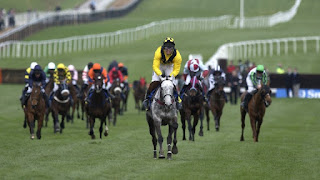The transformation began at one Cheltenham Festival and was completed at the next. What came before and after were largely mirror images of each other, but it is in no small part due to the before and the after that what came in between was so wonderful to watch.
Nobody could fully explain quite why Rooster Booster suddenly blossomed in the way he did, and there were times when even those closest to him seemingly found it hard to believe what was taking place, but the racecourse evidence was impossible to deny. A horse who had spent his already long career playing the role of valiant loser had metamorphosed into a regular and brilliant winner. For a memorable autumn, winter and spring we had to redefine our understanding of an animal we thought we knew well. We found there was more to discover about Rooster Booster and the more we learned the more we loved.
It helped, of course, that he was grey. No harm was done, either, by the fact he had such a frivolous and catchy name. Yet for all the gifts bestowed upon him by nature and man, it was largely due to Rooster Booster himself that he became so adored.
His was a rags-to-riches story befitting of Eliza Doolittle. This was the product of unheralded parents born into a racing household that, although experienced and talented, was not accustomed to managing superstars. Not that he was a superstar during his time with the racing-mad Mitchell family. Elsie bred him from her own stallion and mare, Riverwise and Came Cottage, her husband Richard trained him with the help of sons Tim and Nick, while daughter Sophie was the jockey for six of the seven races he contested while still in the ownership of the family that brought him into the world.
Those seven runs came between late February 1999 and March 2000. They yielded just the one win, in a Taunton maiden hurdle, but Terry Warner had seen enough to know he wanted in future to watch Rooster Booster running in his own colours. He had also seen enough to believe paying £60,000 to the Mitchells was warranted, even though the veterinary advice given to him was that the animal he was looking to purchase was "wild", so wild in fact the vet could not get sufficiently close to the horse to check his wind.

Comments
Post a Comment